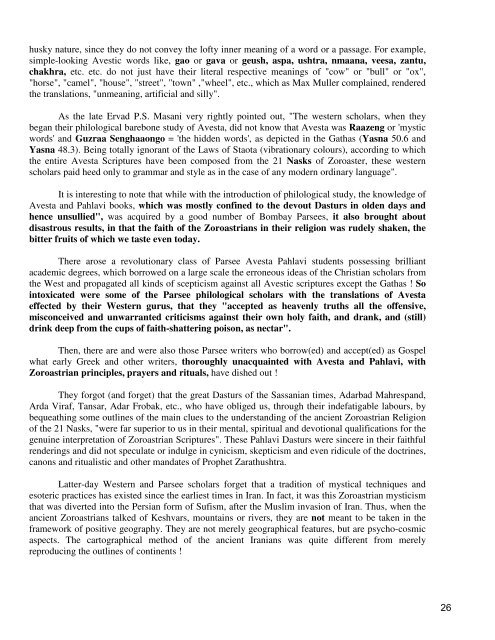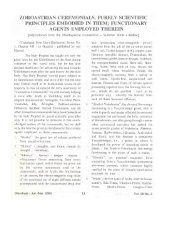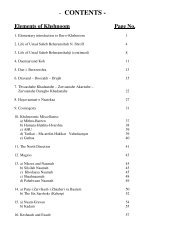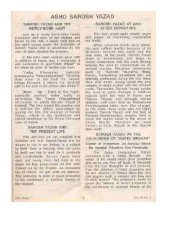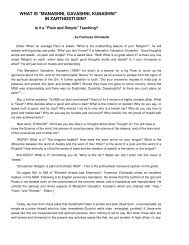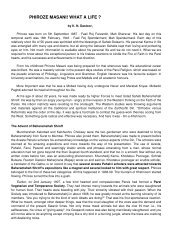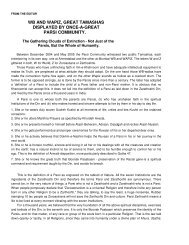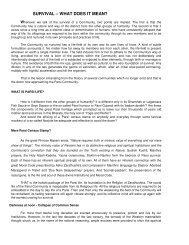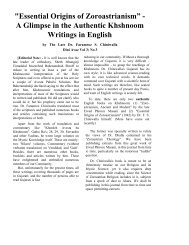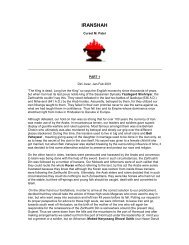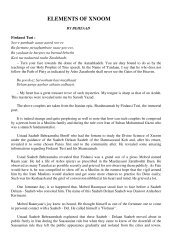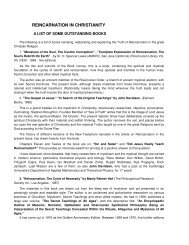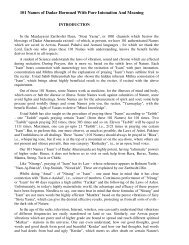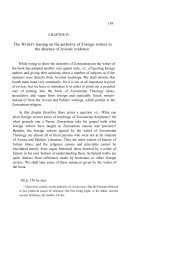Acceptance – Never Ever. - Traditional Zoroastrianism: Tenets of the ...
Acceptance – Never Ever. - Traditional Zoroastrianism: Tenets of the ...
Acceptance – Never Ever. - Traditional Zoroastrianism: Tenets of the ...
Create successful ePaper yourself
Turn your PDF publications into a flip-book with our unique Google optimized e-Paper software.
husky nature, since <strong>the</strong>y do not convey <strong>the</strong> l<strong>of</strong>ty inner meaning <strong>of</strong> a word or a passage. For example,<br />
simple-looking Avestic words like, gao or gava or geush, aspa, ushtra, nmaana, veesa, zantu,<br />
chakhra, etc. etc. do not just have <strong>the</strong>ir literal respective meanings <strong>of</strong> "cow" or "bull" or "ox",<br />
"horse", "camel", "house", "street", "town" ,"wheel", etc., which as Max Muller complained, rendered<br />
<strong>the</strong> translations, "unmeaning, artificial and silly".<br />
As <strong>the</strong> late Ervad P.S. Masani very rightly pointed out, "The western scholars, when <strong>the</strong>y<br />
began <strong>the</strong>ir philological barebone study <strong>of</strong> Avesta, did not know that Avesta was Raazeng or 'mystic<br />
words' and Guzraa Senghaaongo = '<strong>the</strong> hidden words', as depicted in <strong>the</strong> Gathas (Yasna 50.6 and<br />
Yasna 48.3). Being totally ignorant <strong>of</strong> <strong>the</strong> Laws <strong>of</strong> Staota (vibrationary colours), according to which<br />
<strong>the</strong> entire Avesta Scriptures have been composed from <strong>the</strong> 21 Nasks <strong>of</strong> Zoroaster, <strong>the</strong>se western<br />
scholars paid heed only to grammar and style as in <strong>the</strong> case <strong>of</strong> any modern ordinary language".<br />
It is interesting to note that while with <strong>the</strong> introduction <strong>of</strong> philological study, <strong>the</strong> knowledge <strong>of</strong><br />
Avesta and Pahlavi books, which was mostly confined to <strong>the</strong> devout Dasturs in olden days and<br />
hence unsullied", was acquired by a good number <strong>of</strong> Bombay Parsees, it also brought about<br />
disastrous results, in that <strong>the</strong> faith <strong>of</strong> <strong>the</strong> Zoroastrians in <strong>the</strong>ir religion was rudely shaken, <strong>the</strong><br />
bitter fruits <strong>of</strong> which we taste even today.<br />
There arose a revolutionary class <strong>of</strong> Parsee Avesta Pahlavi students possessing brilliant<br />
academic degrees, which borrowed on a large scale <strong>the</strong> erroneous ideas <strong>of</strong> <strong>the</strong> Christian scholars from<br />
<strong>the</strong> West and propagated all kinds <strong>of</strong> scepticism against all Avestic scriptures except <strong>the</strong> Gathas ! So<br />
intoxicated were some <strong>of</strong> <strong>the</strong> Parsee philological scholars with <strong>the</strong> translations <strong>of</strong> Avesta<br />
effected by <strong>the</strong>ir Western gurus, that <strong>the</strong>y "accepted as heavenly truths all <strong>the</strong> <strong>of</strong>fensive,<br />
misconceived and unwarranted criticisms against <strong>the</strong>ir own holy faith, and drank, and (still)<br />
drink deep from <strong>the</strong> cups <strong>of</strong> faith-shattering poison, as nectar".<br />
Then, <strong>the</strong>re are and were also those Parsee writers who borrow(ed) and accept(ed) as Gospel<br />
what early Greek and o<strong>the</strong>r writers, thoroughly unacquainted with Avesta and Pahlavi, with<br />
Zoroastrian principles, prayers and rituals, have dished out !<br />
They forgot (and forget) that <strong>the</strong> great Dasturs <strong>of</strong> <strong>the</strong> Sassanian times, Adarbad Mahrespand,<br />
Arda Viraf, Tansar, Adar Frobak, etc., who have obliged us, through <strong>the</strong>ir indefatigable labours, by<br />
bequeathing some outlines <strong>of</strong> <strong>the</strong> main clues to <strong>the</strong> understanding <strong>of</strong> <strong>the</strong> ancient Zoroastrian Religion<br />
<strong>of</strong> <strong>the</strong> 21 Nasks, "were far superior to us in <strong>the</strong>ir mental, spiritual and devotional qualifications for <strong>the</strong><br />
genuine interpretation <strong>of</strong> Zoroastrian Scriptures". These Pahlavi Dasturs were sincere in <strong>the</strong>ir faithful<br />
renderings and did not speculate or indulge in cynicism, skepticism and even ridicule <strong>of</strong> <strong>the</strong> doctrines,<br />
canons and ritualistic and o<strong>the</strong>r mandates <strong>of</strong> Prophet Zarathushtra.<br />
Latter-day Western and Parsee scholars forget that a tradition <strong>of</strong> mystical techniques and<br />
esoteric practices has existed since <strong>the</strong> earliest times in Iran. In fact, it was this Zoroastrian mysticism<br />
that was diverted into <strong>the</strong> Persian form <strong>of</strong> Sufism, after <strong>the</strong> Muslim invasion <strong>of</strong> Iran. Thus, when <strong>the</strong><br />
ancient Zoroastrians talked <strong>of</strong> Keshvars, mountains or rivers, <strong>the</strong>y are not meant to be taken in <strong>the</strong><br />
framework <strong>of</strong> positive geography. They are not merely geographical features, but are psycho-cosmic<br />
aspects. The cartographical method <strong>of</strong> <strong>the</strong> ancient Iranians was quite different from merely<br />
reproducing <strong>the</strong> outlines <strong>of</strong> continents !<br />
26


